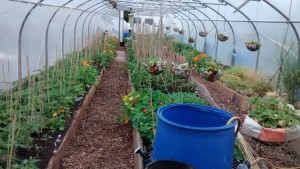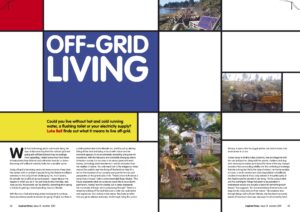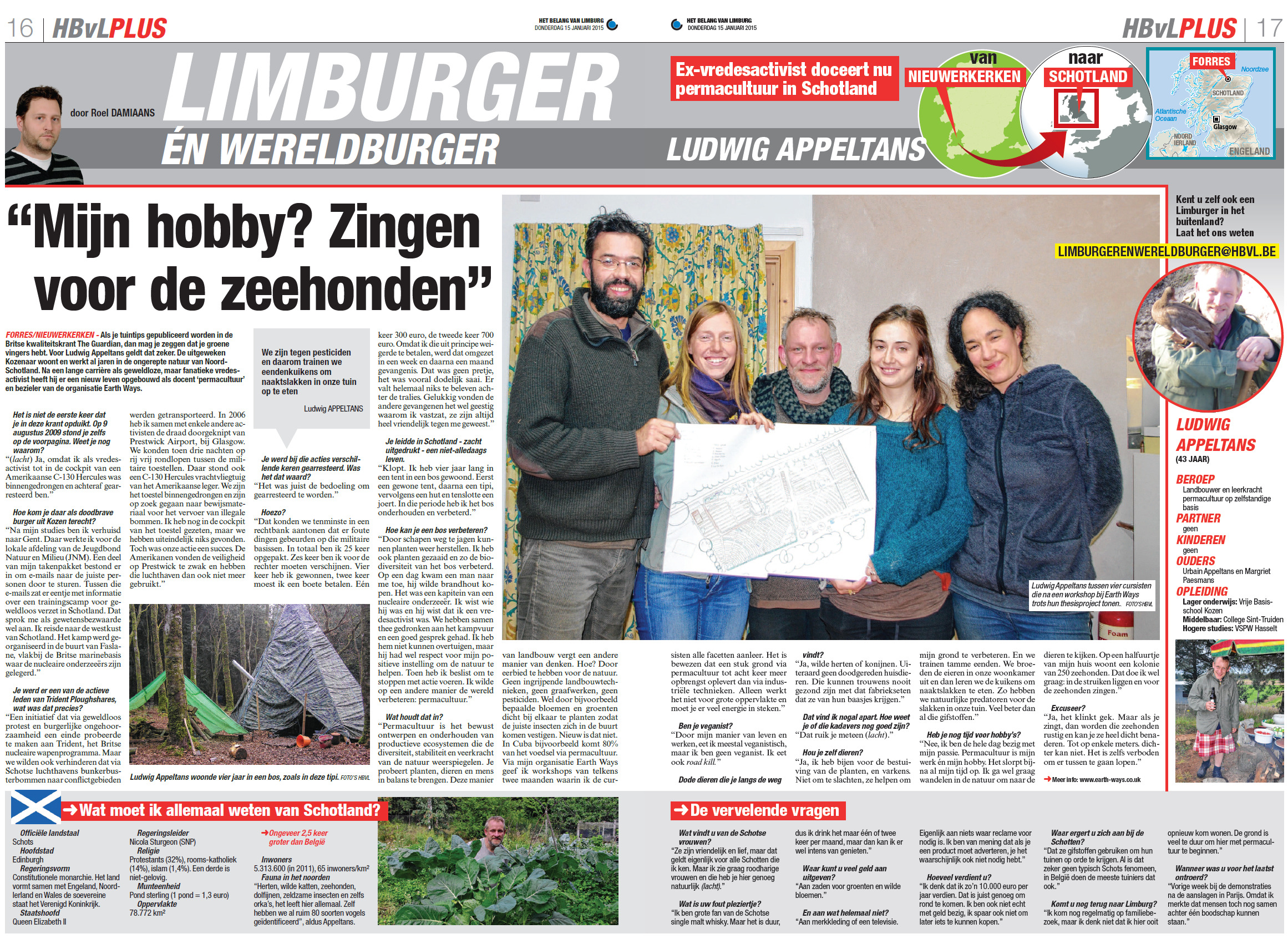A video of our community from 2019
Jump To:
- What is Rubha Phoil?
- Our Mission
- Meet the Founder
- Where is Our Sacred, Ancient Rock?
- Get Involved
- Rubha Phoil and Ludwig in the Media
- Certificates and Acknowledgments
What is Rubha Phoil?
Rubha Phoil is home for a small regenerative culture community and permaculture project. Here, our community members and visitors will find opportunities to rest, heal and build resilience. Visitors leave Rubha Phoil with the knowledge and inspiration to use nature, permaculture and community to become a part of the solution. Permaculture is more than a sustainable option. At Rubha Phoil, we see permaculture as a system to live wholesomely and in abundance.
Here, the ethics of permaculture are woven into every aspect of the rock. These ethics are:
- Earth Care: We preserve the soil, protect biodiversity, conserve energy and natural resources and keep the air and water clean.
- People Care: We take care of ourselves and each other’s health and well-being through the nourishment of good food, lifelong learning, trust, respect and meaningful work.
- Fair Share: We emphasize the equitable distribution of resources, networking, cooperation, and reduction of consumerism. This starts by rethinking notions of growth, progress and development. Fair Share also means honouring the people that came before us and preserving the planet for those who will come after us.
Rubha Phoil is a physical rock and community as well as a virtual one. Learn more about our virtual village here!
Our Mission
Rubha Phoil is a nature-based regenerative culture community, where a small group of people of all ages can create and demonstrate a fulfilling and thriving existence on and from the land, while enhancing the ecosystem they live in.
Vision Statement
Our vision is to create a thriving, resilient and diverse community, a place of reconnection to nature and ourselves, and to model and teach permaculture and community building.
Meet the Founder
Where I come from
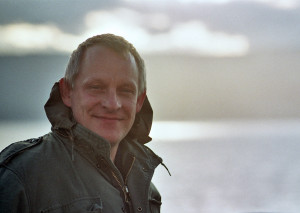 When I learned about the biodiversity crisis and climate change as a child, I became hyper focussed with finding solutions. When I found out that trees produce the oxygen we breathe, I convinced my parents to plant an oak tree in the garden. I was constantly searching for solutions and learning new things that would be useful in the challenged future we now face. At this young age, I was sure that I wanted to be part of the solution, but I did not yet know how my own mind and my life’s journey would become valuable resources in this mission.
When I learned about the biodiversity crisis and climate change as a child, I became hyper focussed with finding solutions. When I found out that trees produce the oxygen we breathe, I convinced my parents to plant an oak tree in the garden. I was constantly searching for solutions and learning new things that would be useful in the challenged future we now face. At this young age, I was sure that I wanted to be part of the solution, but I did not yet know how my own mind and my life’s journey would become valuable resources in this mission.
I was eight years-old when I realized that I was different from other people. School didn’t really suit me. It was highly illogical. I learned things I was interested in really fast and was bored mostly while observing the crows in the playground.

Through reflection, research and peer advice, I have self-diagnosed to be neurodivergent. Understanding this difference in my brain has help me feel confident that I have solutions to offer. Diversity after all is what makes nature resilient.
Neurodiversity is nature’s diversity in action and diversity is essential to any healthy system.
As a conscious communicator, I also can’t help but notice and act upon manipulation and dishonesty. My desire to be a part of the climate solution, my impulsive honesty and my disregard for popularity has conjured a career in activism. You can see more on this part of my life, here.
During my time as an activist, I separated myself from western culture. I went to live in the forest for four years. This extended time as a hermit in nature was an opportunity to understand my own conditioning through Western Culture. This unique perspective was the key to decolonizing myself and breaking free of conditioning. The forest is rich with wisdom, but you have to connect with it to learn from it. The treasure of skills and experiences I had there enabled me to create a connecting culture and regenerative culture in myself and in my surroundings. My personal liberation is the framework from which I help others shed their conditioning of Western Culture. I have developed a technique called “echo location” for this very purpose.
Where I’m going
My neurodiverity and my time in the forest are the two main elements in my identity and the force that drives my work today. Permaculture is about conscious design through knowledge of the environment, finding patterns, and making connections. Spending four years in the forest provided me with a wealth of information about the Scottish ecosystem, and my neurodivergent mind is my key to spotting patterns and making connections.
The ability to read patterns and relationships really well is a common trait in neurodivergent people. This is why neurodivergence is such an asset to the Permaculture Design network. This ability leads to a deep understanding of how nature works, predicting cause and effect, efficiently reducing leaks, and increasing yields. These are all key to creating what we in the Permaculture community call “The Spiral of Abundance”.
As a kid, I mainly studied fortress building, indigenous cultures and the classic heroes tales. Once I was old enough to make my own decisions, I walked a journey through all the elements I deemed essential to creating solutions to climate change. The solution I found?
The creation of a regenerative culture to replace the present disconnecting culture.
I began researching every aspect of what a regenerative culture would take to create and have connected with a rich network of experts in their fields to continue to learn in our ever-changing world. These are just a few of those aspects:
⋅ permaculture growing ⋅ forest gardening ⋅ permaculture design ⋅ psychology ⋅ trauma healing ⋅ spirituality ⋅ peace making ⋅ healthy sexuality ⋅ simple technology life hacks ⋅ culture ⋅ community ⋅ democracy ⋅ activism ⋅ education ⋅ land management ⋅ survival skills ⋅ nature connection ⋅ mental health ⋅ physical health ⋅ well-being ⋅ circular economy ⋅ nutrition ⋅ grief-healing ⋅ symbiotic relationships ⋅ the list goes on
My high-functioning neurodivergent mind has consciously trained me into being fully aware of the culture of interaction between people. This awareness helps me orchestrate a connecting culture. My design, combined with the model created by Jon Young and the 8-Shields Institute have made Rubha Phoil into a place of connection, teamwork and growth for the members, volunteers and tourists that walk our paths and meet together at The Hearth (the heart and literal fire of Rubha Phoil). Our mission aims to help us and future generations achieve
The 8 Attributes of Connection:
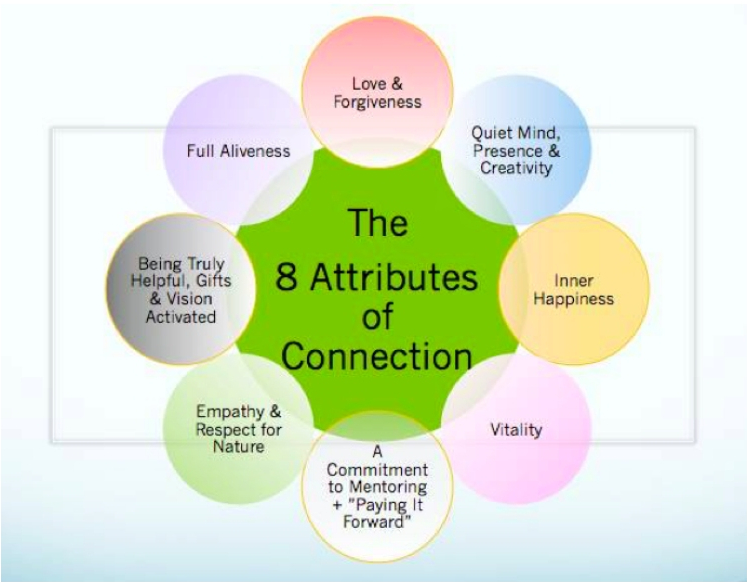
As part of this mission, I have created a model of communication with Heart Stones. This model works really well for my unusual mind, but I recommend it for neurotypical and neurodivergent people alike. You can learn more about Heart Stones here. If you work with me, I ask that you please use clear language in our communications. The idea that neurodivergent people do not experience empathy is a myth. Rather, we express ourselves differently than neurotypical people are accustomed to, so it sometimes throws them off. Through clear communication and understanding, I connect deeply. You can do the same!
I have always had an affinity for nature. Nature makes more sense to my brain than human interactions, so I chose to grow that nature connection. Over the years, this has come in the form of playing in the rain as a child, being a scout master in my late teens, organizing survival expeditions for kids in care in my early twenties, and living entirely off-grid in a Scottish woodland for four years with just a self-made shelter and wood burning stove. These experiences have trained me to hone natural skills and make me the person I am today. I learned to read my ecosystem and live in harmony with it, unlearned conditioning from Colonial Culture, and retrained my brain to unleash my full potential.
I am a village builder, a teacher, a designer for a resilient future, a warrior for peace and justice, a steward of the Earth, but most of all, a mentor to help people connect with themselves, others, and nature.
Ludwig Leòdhas Otter Appeltans
Neach Glèidhidh Tìr Rubha Phoil – The custodian of Rubha Phoil. Video by Le Caitlin NicCoinnich
Where is Our Sacred, Ancient Rock?
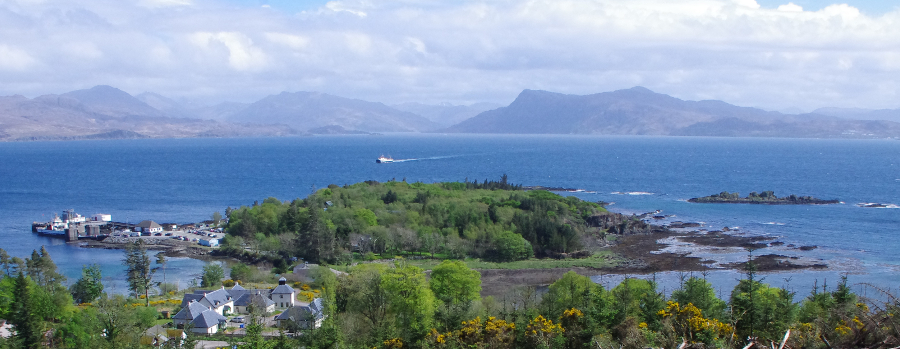
Rubha Phoil is an ancient rock connected to the shores of the Isle of Skye, off the West Coast of Scotland. The rock itself is some of the oldest rock on our planet. Since its formation, Rubha Phoil has tumbled its way through history picking up tales of its geographical past and human evolution alike. Historians, geologists, and inhabitants have been picking up clues and carefully documenting the history of this rock. Discover the timeline of the history of Rubha Phoil here!
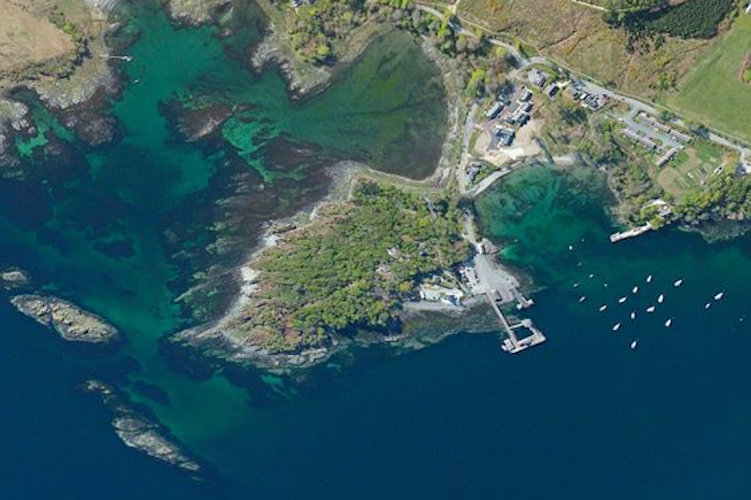
Get Involved
Visiting and Learning
We offer online and in-person talks, workshops and courses for individuals or for groups. Visitors are welcome at Rubha Phoil to walk the paths and camp or stay in one of our dwellings on-site. There will be opportunities to see permaculture in action, as well as pay or volunteer in exchange for informative talks with staff about;
⋅ forest gardening ⋅ permaculture ⋅ regenerative culture design ⋅ bushcraft ⋅ survival ⋅ nature connection ⋅
You can find testimonies from former students, clients and other people I have inspired here.
It is good to know that you need to Join the Virtual Village to trade with Rubha Phoil. We want to pioneer a local economy and we prefer to accept payment in Rubha Rocks though you can use £’s too. You can invest in Rubha Rocks by exchanging your £’s to Rubha Rocks or earn them on the Village. You can learn more here.
Work exchange
Rubha Phoil is always looking for people to come and help out, to stay on the Rock short or long term. Food and accommodation is provided at a rate of 50RR (Rubha Rocks) per day. You can earn Rubha Rocks or exchange them for £’s. Depending on the technical level of the task, this day rate equates about five hours of work and chores per day, 5 days a week. Accommodation comes in the form of caravans or huts. The meals at Rubha Phoil are vegan with an emphasis on sustainable sourcing and foraging. You will be asked to cook sometimes, as cooking responsibility rotates through the team.
Click here to read more and to apply for a work exchange!
Living Long-Term
We would love to add members to our community that are looking for a long-term home. There’s a lot to learn about permaculture and it works best when the caretakers really know the land. This knowledge comes with time. Communities also need children. We are opening a home complete with wood-fire stove to a family that is interested in being a part of our community and project. If this is you, please get in touch!
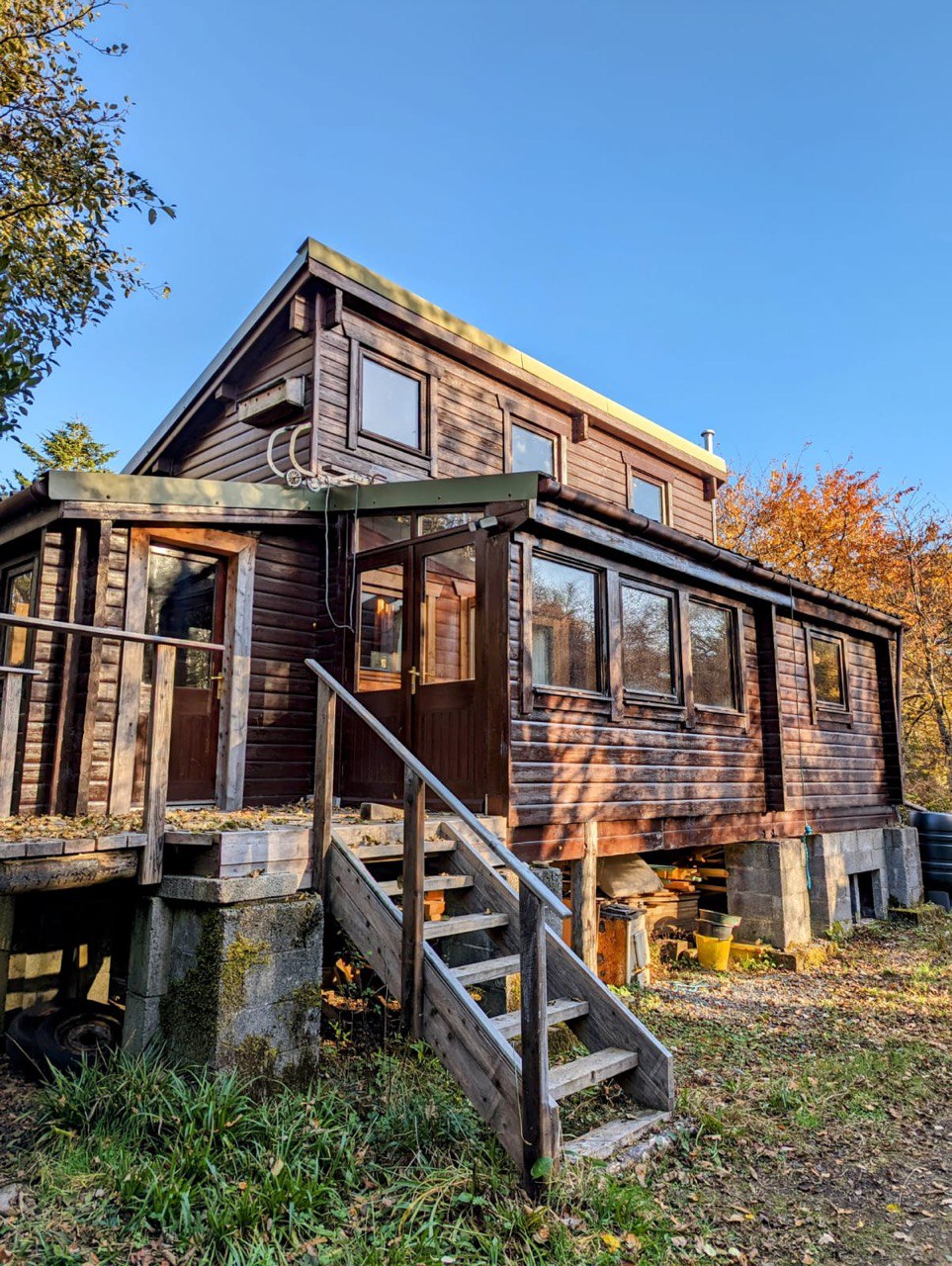
Click here to read more and to apply to join or a visit!
Rubha Phoil in the Media
Inspired Times Article about Ludwig’s Time Living in the Forest, Autumn 2011
Flemish Newspaper Writes a Story of Ludwig’s Life, 2015
Het Belang van Limburg, a mainstream Flemish newspaper tells Ludwigs journey, from his time in the woods, to his permaculture ventures.
Ludwig and Suzanne de Waard Publish an Article on sustainable polytunnels
In this article, Ludwig and Suzanne explain how to make your own permaculture poly-tunnel.
Lisa, a long term team member is interviewed by the Telegraph.
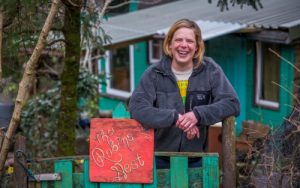
Ludwigs Article on “Dealing with Slugs in a Permaculture Garden” is Published, 2012
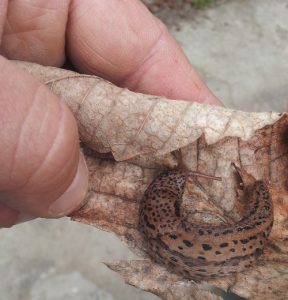
Ludwig has written and regularly updates his article on garden slugs on this website. Over time, this article, in its various forms, has been published by Permaculture Magazine, The Guardian, and lowimpact.org.
Short Film about Ludwig’s Mission
Video made by Katie Reeves.
The radio show “Earth Matters” from Radio Bath came for a visit to Rubha Phoil for an interview with Otter.
We had a really interesting conversation! Thank you Nick and Chrissie.
You can listen again. Our interview starts at about 21.20 and lasts about 18 mins.
